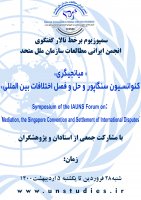

Dr. Andrea Hartmann-Piraudeau - IMI Certified International Mediator & Researcher & Founder of IM-Campus
2021/04/24
The fact that mediation is an effective method of resolving conflicts in a self-determined and sustainable way has been proven at various levels of living together, working together, and trading together. The method of mediation itself is rarely called into question but nevertheless, mediation is less widespread in most countries than would be expected after weighing up all the arguments for and against it. Particularly when one considers the success rate of the process, which is estimated to be over 80% of all mediation processes initiated in Germany and even higher for other countries in special areas, it is difficult to understand why mediation is not chosen much more frequently as an alternative dispute resolution.
One hurdle, and this applies to several countries with very different structures, is still the lack of knowledge about the availability of mediation. Another barrier is the self-determination of the process. What is described as one of the greatest advantages by practitioners and conflict parties who have chosen mediation - is a prominent factor of uncertainty in the decision for or against the procedure. In most cultures, we are used to others making decisions for us when things get difficult: parents, elders, hierarchically superior leaders, judges, arbitrators. This has always been the case - taking the conflict into our own hands and finding a joint solution seems unfamiliar to companies, lawyers, and other parties to the conflict. Alien we associate with higher risks- risks with potential losses- the rejection of mediation is obvious.
And there is another factor that prevents us from resolving our commercial disputes through mediation: the complex situation of different legislations in different countries. Trade is global - laws and transparent procedures exist for the movement of goods - but dispute resolution is largely local. The Singapore Convention is a ground-breaking innovation in this field. Cross-border enforcement of settlement agreements results from mediation. For the states involved, the world is moving closer together - not only can we trade, but we can also resolve conflicts together.
2020, a year that will not necessarily be remembered positively, has given us a gift for cross-border mediation: the new digital normality. For years we took to the plane, the train or the car, made long journeys, stuck traffic jams and stayed in cold hotel rooms to be able to meet with colleagues and business partners, we now click on "start videoconference". We have gone through a steep learning curve, whereas at the beginning of the year most participants of a conference sat barely visible in dark rooms, and only after 10 minutes, wild gesticulations of all participants and camera and sound test most of them were connected. We now see well-lit people, in front of professional backgrounds with sophisticated digital moderation and working techniques. Small meetings, large conferences, teaching, family closeness- everything is digital. People have lost the shyness to see themselves and speak, even if the other person is not physically present, they have learned to read others better, even if not the body but only the face and the voice are visible. We have developed a new competence and are still developing it – effective communication in the digital space.
This is an asset for mediation, especially for mediation between parties who are many kilometers or even an ocean apart. Online mediation has become the new normal here, too. At first, conflicts were postponed in the hope that the virus would soon go away. When it became clear that this would take time, online mediation was chosen as a method "when there is no other way", as a compromise - but it soon became clear that conflict resolution in the digital space is more than that: it enables flexibility, quick action, fast exchange of documents, digitally managed documents such as draft agreements, synchronous translation on a second audio channel, easier documentation and finally CO2 savings.
The self-confidence of those involved in digital communication has been built up in many hours of uncontentious discussions among colleagues or in teams and helps us to achieve good and sustainable results in contentious situations, also digitally.
It would be desirable, if we maintain this normality, make mediation easier accessible and let us work on improving our digital mediation and moderation skills and methods. This new normal will not replace our old normal, and that is a good thing, but it will have the potential to use mediation more flexibly and make it widely accessible. With this new setting, there is hope that the Singapore Convention for the clarification of cross-border conflicts will develop into a positive pandemic that not only reaches a few countries but is activated globally.
آخرین مطالب تالار گفتگو
- سلاح های ضد ماهواره؛ تهدیدی علیه اصل استفاده صلح آمیز از فضای ماورای جو-محمدرضا خلج و کیان بیگلربیگی ۱۴۰۳/۰۵/۰۶
- مروری بر گزارش نخست کمیسیون حقوق بین الملل درباره موافقتنامه های بین المللی غیرالزام آور-نرگس رشیدی ۱۴۰۳/۰۴/۲۹
- تصمیم دیوان بین المللی دادگستری در دعوی نیکاراگوئه علیه آلمان و ابهاماتی که بدون پاسخ ماند-سید محمد امین حسینی نسب ۱۴۰۳/۰۴/۲۳
- اتحادیه اروپا و هوش مصنوعی: گامی در مسیر پیشرفت یا نقض حقوق بشر؟-حبیبه فرج زاده ۱۴۰۳/۰۴/۱۹
- نقش آکادمی بیگدلی در پیشبرد نهضت ترجمه حقوق بینالملل در ایران-دکتر سیدقاسم زمانی ۱۴۰۳/۰۴/۱۸
- همکاری دو دیوان؟ بررسی عملکرد دادستان دیوان بین المللی کیفری در انتخاب عناوین مجرمانه در درخواست صدور قرار جلب علیه نخست وزیر و وزیر دفاع اسرائیل-متین امیری و حنانه جعفری بیدختی ۱۴۰۳/۰۴/۱۲
- بزرگداشت روز بین المللی بازی با نگاهی کلی بر اهمیت فوق العاده بازی کردن-مریم هراتی ۱۴۰۳/۰۴/۰۲
- رویکرد ایتلوس نسبت به حفاظت از محیط زیست دریایی در اقلیم در حال تغییر-دکتر مهناز رشیدی و دکتر مهشید آجلی لاهیجانی ۱۴۰۳/۰۳/۲۹
- درآمدی بر دعاوی اخیر میان مکزیک و اکوادور در دیوان بین المللی دادگستری-سجاد قدمیاری و سیروان سلیمانی ۱۴۰۳/۰۳/۲۲
- نگاهی بر نظریه مشورتی دیوان بینالمللی حقوق دریاها درباره تغییرات اقلیمی-معصومه حسینی ۱۴۰۳/۰۳/۱۹
- «یک پنجره، چند نگاه»: مسائل اقلیت ها از دیدگاه گزارشگر جدید طبق گزارش سالانۀ 2024-دکتر ستار عزیزی و موسی کرمی ۱۴۰۳/۰۳/۱۵
- سایه عدالت سبز بر سر دیوان اروپایی حقوق بشر؛ نگاهی بر رأی تاریخی این دیوان علیه دولت سوئیس پیرامون تغییرات اقلیمی-روژین تقدیسی نژاد و کیان بیگلربیگی ۱۴۰۳/۰۳/۱۲
- اصلاح قرار اقدامات موقت دیوان بینالمللی دادگستری در قضیه آفریقای جنوبی علیه اسرائیل و دستور توقف عملیات نظامی -صادق بشیره ۱۴۰۳/۰۳/۰۸
- گذاری بر تقاضای دادستان دیوان کیفری بین المللی برای صدور قرار جلب در قضیه فلسطین-دکتر هادی ذاکرحسین ۱۴۰۳/۰۳/۰۵
- رای دادگاه اروپایی حقوق بشر علیه دولت سوئیس در خصوص نقض تعهدات اقلیمی-محدثه نخودچی ۱۴۰۳/۰۳/۰۱
- قطعنامه مجمع عمومی سازمان ملل متحد در خصوص هوش مصنوعی و توسعه پایدار: مهم و تاریخی؛ اما ناکافی-محمدجواد ذوالقدر ۱۴۰۳/۰۲/۲۹
- درخواست دولت فلسطین برای عضویت در سازمان ملل از منظر حقوق بین الملل-دکتر علی اکبر سیاپوش ۱۴۰۳/۰۲/۲۵
- دستور اقدامات موقتی که صادر نشد: دعوای نیکاراگوئه علیه آلمان-دکتر مهشید آجلی لاهیجی ۱۴۰۳/۰۲/۲۲
- یادی از «سروِ سخنگویِ ایران»: معرفیِ کوتاهِ کتابِ «ذکر مناقب حقوق بشر در جهان سوم»-دکتر امیر مقامی و موسی کرمی ۱۴۰۳/۰۲/۰۸
- تحریم نهادهای علمی ایران توسط کانادا از منظر حقوق بین الملل-آرش ملکی ۱۴۰۳/۰۲/۰۴
- دفاع مشروع در برابر حمله به اماکن دیپلماتیک: تفسیر یا توسیع منشور ملل متحد-دکتر محسن عبداللهی و دکتر مهناز رشیدی ۱۴۰۳/۰۲/۰۱
- ظرفیت های حقوق بین الملل در واکنش به حمله اسرائیل علیه ساختمان بخش کنسولی سفارت ایران در دمشق ۱۴۰۳/۰۱/۲۸
- کنوانسیون جرایم سایبری: گامی در جهت امنیت یا نقض حقوق بشر؟-حبیبه فرج زاده ۱۴۰۳/۰۱/۲۵
- تأملی بر آموزش حقوق بین الملل در کشورهای در حال توسعه-دکتر محمدرضا ضیائی بیگدلی ۱۴۰۳/۰۱/۲۱
- سرنوشت «حمایت» از نسلهای آینده توسط سازمان ملل متحد-دکتر نسرین مصفا ۱۴۰۳/۰۱/۱۸
- مواجهه معاهدات سرمایه گذاری با تغییرات اقلیمی-زهرا قادری خوراسگانی و کیان بیگلربیگی ۱۴۰۲/۱۲/۲۹
- The Legal Regime of the Caspian Sea Following Russian Military Aggression-Farshad Kashani ۱۴۰۲/۱۲/۲۶
- نیم نگاهی به دستورالعمل های تالین در باب حقوق بین الملل حاکم بر فضای سایبر -موسی کرمی ۱۴۰۲/۱۲/۱۹
- تجارت و انتقال تسلیحات؛ الزامات حقوق بین الملل در جنگ غزه-دکتر فریده محمدعلی پور ۱۴۰۲/۱۲/۱۲
- قدرت فیلم؛ 10 مستندی که ذهنیت شما را در خصوص تغییرات اقلیمی تغییر می دهند-امین علوی و صادق بشیره ۱۴۰۲/۱۲/۰۸
- از ایزدبانوی زمین تا پاسدار محیط زیست-موسی کرمی،شراره ابطحی و دکتر علی مشهدی ۱۴۰۲/۱۲/۰۵
- بررسی میزان پایبندی اعضا به تعهدات مالی براساس اولین گزارش پایش جامع جهانی در کنفرانس اقلیمی دبی-دکتر اعظم امینی و زهرا سماعی ۱۴۰۲/۱۱/۲۸
- درخواست صدور دستور اقدامات موقت توسط دیوان بینالمللی دادگستری مبنی بر توقف عملیات نظامی در دعوی آفریقای جنوبی علیه اسرائیل(2024) در مقایسه با دعوای اوکراین علیه روسیه(2022)-صادق بشیره ۱۴۰۲/۱۱/۲۱
- سودای پرواز فرشته عدالت و نکاتی در خصوص دستور موقت دیوان بین المللی دادگستری در قضیه اعمال کنوانسیون ژنوسید در باریکه غزه-دکتر پوریا عسکری ۱۴۰۲/۱۱/۱۴
- ادراک حقوق بینالملل از مجرای رویّهی قضایی بینالمللی: معرفی کتاب «دیوان بینالمللی دادگستری» -صبا گلنارکار ۱۴۰۲/۱۱/۰۷
- نگاهی به دعوی آفریقای جنوبی علیه اسرائیل در دیوان بین المللی دادگستری-دکتر امیر مقامی ۱۴۰۲/۱۰/۳۰
- نگاهی تفسیری به تصمیم نشست دبی در زمینه تغییر اقلیم؛ گذار از سوخت های فسیلی با روشی عادلانه، منظم و منصفانه-دکتر اعظم امینی و فهیمه مقصودی ۱۴۰۲/۱۰/۲۳
- اقدامات جیش العدل و امکان طرح مسئولیت بین المللی دولت پاکستان-آرش ملکی ۱۴۰۲/۱۰/۱۶
- واکاوی اصل تفکیک در حقوق بینالملل بشردوستانه: نگاه موردی به عملیاتهای حماس و اسرائیل-دکتر سیامک کریمی و ساوالان محمدزاده ۱۴۰۲/۱۰/۱۰
- «خوشه های خشم»: درنگی در پایان «دولت خودخوانده آرتساخ» و پایایی «مسئله قره باغ» -دکتر ستار عزیزی و موسی کرمی ۱۴۰۲/۱۰/۰۲
- دستورهای موقت متعدد و بی اعتنایی های مکرر؛ چالشی بر دستورهای موقت دیوان بین المللی دادگستری در پرتو جنگ قره باغ-افسون سربخشیان و کیان بیگلربیگی ۱۴۰۲/۰۹/۲۵
- چارچوب جهانی مواد شیمیایی و پنجمین کنفرانس بینالمللی مدیریت مواد شیمیایی-الهه پوینده ۱۴۰۲/۰۹/۱۸
- شکاف دیجیتال؛ سدّ راه حقوق بشر در عصر فناوری اطلاعات و ارتباطات-حبیبه فرج زاده ۱۴۰۲/۰۹/۱۴
- چالش های تامین مالی ثالث بر فرآیند حل وفصل اختلافات دولت-سرمایه گذار با نگاهی بر گزارش کارگروه سوم آنسیترال- متین امیری و محمد یعقوبی ۱۴۰۲/۰۹/۱۱
- حقوق کودکان در مخاصمات مسلحانه؛ واکاوی اسناد بین المللی و حمایت های موجود-فاطمه انصاری ۱۴۰۲/۰۹/۰۴
- «پله پله تا ملاقات» خویشتن: اتمام محدودیت ایران در زمینه فعالیتهای مربوط به موشکهای بالستیک در قطعنامه 2231-دکتر عبداله عابدینی ۱۴۰۲/۰۸/۲۷
- جنگ اخیر غزه از منظر حقوق اشغال نظامی-دکتر هاجر سیاه رستمی ۱۴۰۲/۰۸/۲۰
- سخنان رئیس دیوان بین المللی دادگستری در کمیته حقوقی مجمع عمومی در مورد امکان اصلاح اساسنامه دیوان -دکتر اسماعیل بقائی هامانه ۱۴۰۲/۰۸/۱۳
- امکان سنجی تعقیب جرایم سایبری بین المللی در دیوان بین المللی کیفری-سیدمحمدامین علوی ۱۴۰۲/۰۸/۰۶
- جنگ اخیر غزه از منظر حقوق بین الملل بشردوستانه-دکتر جبار اصلانی ۱۴۰۲/۰۷/۲۹
- تلاش جهت برابری جنسیتی در عصر دیجیتالیسم؛ پدیدههای فناورانه، منبع جدید تبعیض علیه دختران(مروری بر گزارش نشست سالانه کمیته سازمان ملل متحد در مورد وضعیت زنان و دختران در سال ۲۰۲۳)-محمدمهدی سیدناصری ۱۴۰۲/۰۷/۱۵
- شرکتهای فراملی؛ شمشیری دولبه در مواجهه با تغییرات اقلیمی-معصومه حسینی ۱۴۰۲/۰۶/۱۸
- ابر چالش هموساپینسها؛ لزوم تاسیس آژانس بینالمللی هوش مصنوعی-رامین کیانی ۱۴۰۲/۰۵/۲۸
- مروری بر نسخه نهایی دستورالعمل کارگروه سوم آنسیترال در خصوص رفتار داوران در حل وفصل اختلافات سرمایه گذار-دولت-محمد یعقوبی ۱۴۰۲/۰۵/۲۱
- حق بر آموزش برابر و تعهدات دولتها - مروری بر گزارش ۲۷ ژوئن 2023 گزارشگر شورای حقوق بشر-دکتر عزیزی و آقای سیدناصری ۱۴۰۲/۰۴/۳۱
- حقوق کودکان و محیط زیست با تمرکز بر تغییرات اقلیمی: نگاهی بر نظریه عمومی شماره ۲۶ کمیته حقوق کودک-محیا رحمت اللهی ۱۴۰۲/۰۴/۲۷
- نگاهی اجمالی به فرجام طرح دعوی ایران علیه کانادا در دیوان بینالمللی دادگستری در پرتو رویه پیشین آن-دکتر ستار عزیزی ۱۴۰۲/۰۴/۱۳
- ابزارهای فرعی برای شناسایی قواعد حقوق بین الملل-دکتر شهرام زرنشان ۱۴۰۲/۰۳/۲۷
- اقدامات سازمان ملل متحد برای صلح سازی در سودان-علی میراحمدی ۱۴۰۲/۰۳/۱۶
- اعلام خاتمه وضعیت اضطراری بین المللی کرونا: نگاهی به آثار حقوقی احتمالی-دکترعلی اکبر سیاپوش ۱۴۰۲/۰۳/۰۹
